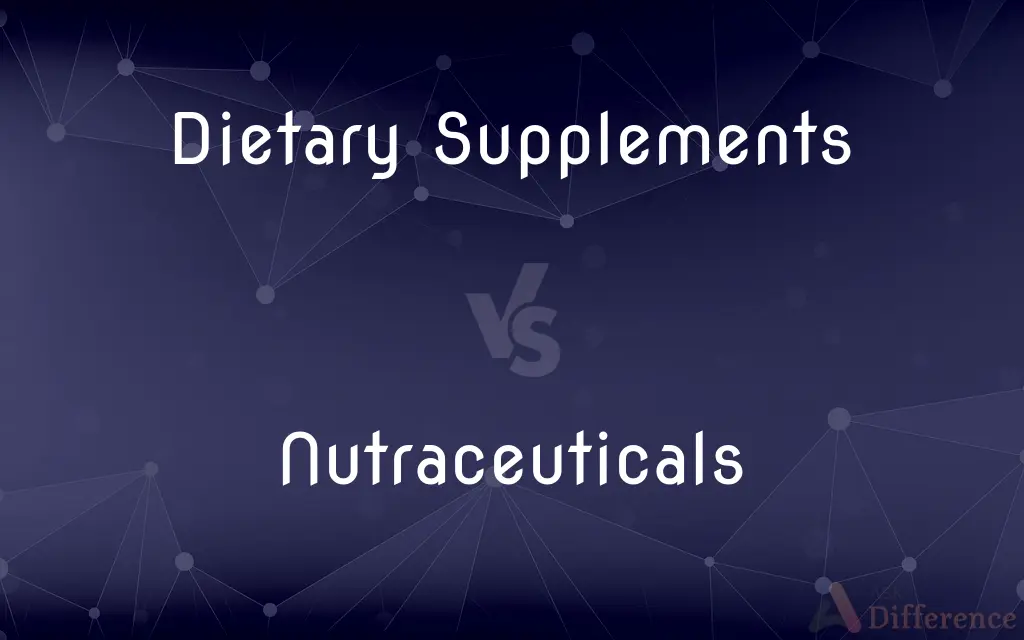Dietary Supplements vs. Nutraceuticals — What's the Difference?
Edited by Tayyaba Rehman — By Fiza Rafique — Published on July 27, 2024
Dietary supplements are products intended to supplement the diet, while nutraceuticals are food-derived products offering medical or health benefits beyond basic nutrition.

Difference Between Dietary Supplements and Nutraceuticals
Table of Contents
ADVERTISEMENT
Key Differences
Dietary supplements and nutraceuticals both aim to enhance health, but they serve different purposes and are regulated differently. Supplements are primarily designed to provide nutrients that may not be consumed in sufficient quantities in a person's diet. They include vitamins, minerals, amino acids, and can come in various forms like pills, capsules, or powders.
Nutraceuticals, on the other hand, are products derived from food sources with extra health benefits, such as prevention or treatment of disease, beyond basic nutritional value. These can include fortified foods, dietary supplements, or herbal products.
The regulatory landscape for these products also differs significantly. In many regions, dietary supplements are regulated more like food products, with less stringent requirements than pharmaceuticals. Nutraceuticals, depending on their claimed health benefits, might be subjected to more rigorous regulatory scrutiny, similar to pharmaceuticals. This distinction is important for consumers to understand, as it affects the claims these products can legally make and the evidence required to support those claims.
Another key difference lies in their intended use and marketing. Dietary supplements are marketed for general well-being and to fill nutritional gaps, without specific claims about treating or preventing diseases. Nutraceuticals often come with claims of enhancing health in specific ways, such as improving heart health or boosting the immune system. This difference in positioning reflects the broader health aspirations of nutraceuticals compared to the more nutrition-focused aims of dietary supplements.
Despite these differences, the line between dietary supplements and nutraceuticals can sometimes blur, as both aim to promote health and well-being through dietary means. Consumers are advised to consider their health goals and consult healthcare professionals when choosing between these products, taking into account the regulatory distinctions and evidence supporting their use.
ADVERTISEMENT
Comparison Chart
Definition
Products intended to supplement the diet
Food-derived products with medical benefits
Primary Purpose
Fill nutritional gaps
Offer health benefits beyond basic nutrition
Examples
Vitamins, minerals, amino acids
Fortified foods, herbal products
Regulation
Generally less stringent
May be more closely regulated
Marketing Focus
General well-being, nutrition
Specific health claims, disease prevention
Compare with Definitions
Dietary Supplements
Intended to be taken orally.
A daily multivitamin pill.
Nutraceuticals
Products that combine the benefits of nutrition and pharmaceuticals.
Probiotic yogurts claiming to improve digestive health.
Dietary Supplements
Do not claim to treat or prevent diseases.
Calcium supplements are marketed for bone strength, not curing osteoporosis.
Nutraceuticals
Often marketed with specific health claims.
Green tea extracts advertised for their antioxidant properties.
Dietary Supplements
Can be derived from food sources or synthetically produced.
Fish oil capsules for omega-3 fatty acids.
Nutraceuticals
Include both dietary supplements and fortified food products.
Cereals enriched with vitamins and minerals.
Dietary Supplements
Regulated as food products in many jurisdictions.
Dietary supplements must comply with dietary supplement regulations.
Nutraceuticals
Aim to prevent, treat, or manage health issues.
Omega-3 supplements for heart health.
Dietary Supplements
Products designed to supplement dietary nutrient intake.
Taking vitamin D supplements to support bone health.
Nutraceuticals
Subject to varying degrees of regulation based on health claims.
Nutraceuticals claiming to lower cholesterol may require evidence similar to pharmaceuticals.
Nutraceuticals
A food or naturally occurring food supplement thought to prevent disease or have other beneficial effects on human health. Also called functional food.
Nutraceuticals
Plural of nutraceutical
Common Curiosities
What makes a product a nutraceutical instead of a dietary supplement?
Nutraceuticals offer health benefits beyond basic nutrition, sometimes including disease prevention or treatment claims.
Why do nutraceuticals often resemble pharmaceuticals in regulation?
Because of their claims to treat or prevent diseases, nutraceuticals require closer scrutiny to ensure they are safe and effective.
Are there any risks associated with taking dietary supplements or nutraceuticals?
Yes, like any consumable product, there can be risks, especially if taken in excessive amounts or in combination with certain medications.
How should consumers choose between dietary supplements and nutraceuticals?
Consider health goals, consult healthcare providers, and research the regulatory standards and evidence supporting product claims.
How are dietary supplements regulated compared to nutraceuticals?
Dietary supplements are typically subject to less stringent regulations than nutraceuticals, especially if the latter make specific health claims.
Are nutraceuticals considered natural products?
Many are derived from natural food sources, but the term also encompasses products that have been significantly processed or enriched.
Can dietary supplements replace a balanced diet?
No, supplements are intended to fill nutritional gaps, not replace the variety of nutrients from a balanced diet.
What role do healthcare professionals play in the use of dietary supplements and nutraceuticals?
They can provide advice on what may be appropriate for an individual's health needs and what to avoid, especially considering any medical conditions or medications.
Can dietary supplements and nutraceuticals be used interchangeably?
While both can support health, their purposes, regulatory requirements, and health claims differ, so they are not always interchangeable.
Do all countries regulate dietary supplements and nutraceuticals the same way?
No, regulatory frameworks vary significantly across countries, affecting how these products are marketed and sold.
Can a dietary supplement become a nutraceutical?
Yes, if it is clinically proven to offer health benefits beyond basic nutritional support, it may be marketed as a nutraceutical.
Is there scientific evidence supporting the use of nutraceuticals?
The level of evidence varies; some nutraceuticals are well-supported by research, while others may lack solid evidence.
How important is dosage in the effectiveness of dietary supplements and nutraceuticals?
Dosage is crucial; incorrect dosages can lead to ineffectiveness or health risks.
How can consumers verify the safety and effectiveness of these products?
Look for products that have been independently tested by reputable organizations and review scientific research supporting their claims.
Can nutraceuticals prevent chronic diseases?
Some nutraceuticals may help reduce the risk of chronic diseases as part of a healthy lifestyle, but they are not a cure-all.
Share Your Discovery

Previous Comparison
Iced Coffee vs. Iced Latte
Next Comparison
kW vs. kWhAuthor Spotlight
Written by
Fiza RafiqueFiza Rafique is a skilled content writer at AskDifference.com, where she meticulously refines and enhances written pieces. Drawing from her vast editorial expertise, Fiza ensures clarity, accuracy, and precision in every article. Passionate about language, she continually seeks to elevate the quality of content for readers worldwide.
Edited by
Tayyaba RehmanTayyaba Rehman is a distinguished writer, currently serving as a primary contributor to askdifference.com. As a researcher in semantics and etymology, Tayyaba's passion for the complexity of languages and their distinctions has found a perfect home on the platform. Tayyaba delves into the intricacies of language, distinguishing between commonly confused words and phrases, thereby providing clarity for readers worldwide.












































